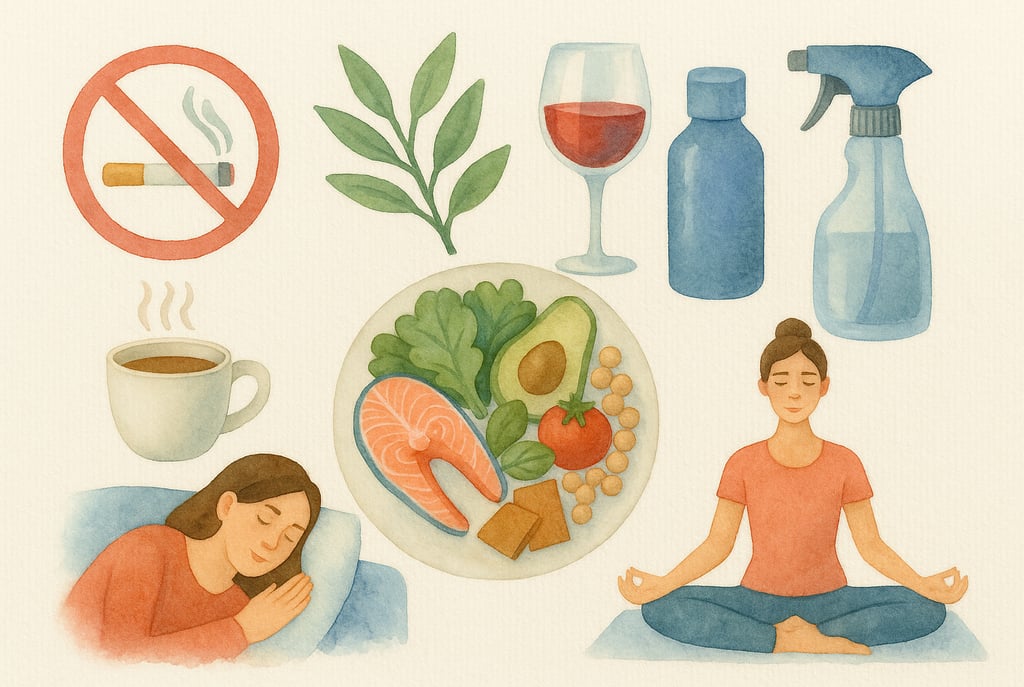Lifestyle Changes Before IVF
Small lifestyle changes can make a big difference before IVF. Here's how to prepare your body for treatment — from quitting smoking to reducing toxins at home.
WELLNESS & FOOD
6/23/20253 min read


Starting IVF can feel like stepping into the unknown — full of hormones, scans, and carefully timed injections. But long before your first appointment, there’s something powerful you can do: create the best possible environment for your body to welcome a pregnancy.
Lifestyle changes aren’t magic fixes, but they can have a real, evidence-backed impact on your fertility. Think of this stage as setting the stage — gently preparing your body, mind, and environment for what’s ahead.
Whether you’re just starting to plan or already have your IVF dates, here are some key areas to focus on.
1. Stop Smoking — Now, Not Later
It’s no surprise that smoking is harmful during pregnancy, but many don’t realise how deeply it affects fertility.
Smoking reduces egg quality and ovarian reserve.
It accelerates reproductive ageing and disrupts hormone balance.
Male partners who smoke have lower sperm count and motility.
If you smoke, quitting is one of the most important changes you can make before IVF. Even secondhand smoke can reduce success rates, so it’s worth encouraging partners to quit too.
2. Cut Back on Alcohol — or Go Alcohol-Free
The evidence on alcohol and IVF is clear: drinking can lower your chances of success.
Even moderate alcohol intake is linked with poorer egg quality and reduced fertilisation rates.
For men, alcohol can damage sperm DNA and reduce testosterone.
Ideally, stop drinking at least 3 months before starting IVF — but even cutting back significantly can make a difference. If you’re finding this hard, especially during social events, try switching to alcohol-free wines or botanical drinks so you don’t feel left out.
3. Manage Caffeine Sensibly
You don’t need to give up your morning coffee entirely — but more than 200mg of caffeine per day (about 2 cups of coffee) may lower IVF success rates.
Tips for caffeine control:
Swap one coffee for herbal tea or decaf.
Remember hidden sources of caffeine — energy drinks, cola, green tea, and chocolate all count.
Track your intake honestly — it's easy to go over without realising.
4. Balance Your Diet Without Going Overboard
You don’t need a restrictive diet before IVF — just a balanced, anti-inflammatory approach.
Key tips:
Focus on whole foods: colourful vegetables, legumes, whole grains, oily fish, nuts and seeds.
Get enough healthy fats — especially omega-3s (found in salmon, chia, flaxseed).
Limit processed foods, trans fats, and refined sugar.
Consider a prenatal supplement with folic acid, vitamin D, and B12 — ask your clinic for guidance.
5. Clean Up Your Environment
Many of us are exposed daily to hormone-disrupting chemicals — and while you can’t eliminate them completely, you can reduce your load.
Steps to consider:
Avoid plastics marked with recycling codes 3 (phthalates) and 7 (BPA).
Use glass or stainless steel containers instead of plastic for food and drink.
Choose fragrance-free and natural cleaning or skincare products.
Open windows daily to reduce indoor air pollution.
6. Move Gently — But Regularly
Exercise can support fertility, as long as it’s not too intense.
Aim for moderate activity like brisk walking, swimming, yoga, or cycling.
Avoid high-impact or strenuous workouts, which may disrupt ovulation or affect embryo implantation.
If you’re already very active, talk to your clinic about how to adapt during IVF.
Exercise also helps with stress reduction, circulation, and sleep — all fertility-friendly factors.
7. Start Managing Stress Proactively
IVF can be a deeply emotional process. Managing stress before you start can help you feel more grounded.
Try:
Journaling, meditation, or breathwork
Counselling or support groups
Fertility coaching or acupuncture
Reducing screen time, especially before bed
You don’t need to be perfectly calm all the time — but having a toolkit in place now makes a big difference later.
8. Prioritise Sleep Like It’s Medicine
Sleep is essential for hormone regulation, egg maturation, and overall wellbeing.
Aim for:
7–9 hours per night
A regular sleep schedule (even on weekends)
A cool, dark bedroom
A phone-free wind-down routine
Disrupted sleep in the months before IVF has been linked to lower success rates — so give yourself permission to rest.
A Gentle Reset, Not a Punishment
Making changes before IVF can sometimes feel like adding pressure to an already high-stress situation. But these adjustments aren’t about perfection or control — they’re about giving your body a peaceful, supported foundation.
Think of it as a quiet preparation phase. A reset. A moment to reclaim agency in a process that often feels full of waiting.
You don’t have to change everything overnight — even one or two adjustments can help. Be kind to yourself, and trust that these small choices matter.
© 2025. All rights reserved.
